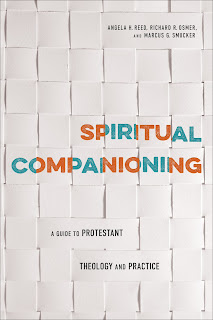Book Review: Spiritual Companioning
 Angela H. Reed, Richard R. Osmer, and Marcus G. Smucker, Spiritual Companioning. Baker Academic, 2015. 208 pages.
Angela H. Reed, Richard R. Osmer, and Marcus G. Smucker, Spiritual Companioning. Baker Academic, 2015. 208 pages. The Need for Community
Spiritual Companioning is co-written by three different authors with diverse Christian backgrounds: Angela Reed, a Baptist; Richard Osmer, a Presbyterian, and Marcus Smucker a Mennonite. Together they diagnose a real need in our busy, individually driven world: real Christian community. They perceive the problem of having a ministry that is program oriented and not people oriented. Their book is an attempted corrective to this problem through spiritual companioning.
They define spiritual companion as “a way of accompanying others in intentional relationships of prayerful reflection and conversation that help them notice God’s presence and calling in their personal lives, local communities, and the world” (pg. xx)
Structure
After establishing the need for spiritual companioning, the authors devote chapters to different ways in which spiritual companioning is accomplished:
1: Spiritual Companioning as Presence
2: Spiritual Companioning in the Congregation
3: Spiritual Companioning in Spiritual Direction
4: Spiritual Companioning in Small Groups
5: Spiritual Companioning in Everyday Life
6: Spiritual Companioning and the Journey of Life
7: Spiritual Companioning for Leaders
Chapter Format
Each chapter roughly follows the same outline:
Introduction Story
Understanding the Cultural Context
Listening to Scripture
Mining the Protestant Tradition
Practicing Spiritual Companions
Exploring the Stories of Congregations
For Further Reading
These chapter divisions are helpful for a wide exposure to the topic being discussed. The mix of culture discussion,Bible interpretation, historical overview and sharing stories make for enjoyable and diverse, albeit, brief sections.
Analysis
I found the introduction and initial chapter to be the strongest in the book. They articulate a Christianity that is not program centered but people centered. That is a sentiment I readily identify with. Another strong chapter is Chapter 4, “Spiritual Companioning in Small Groups”
While their perception of isolation is right, and their commitment to community is sound; their vision of spirituality, at times, borders on mysticism. In each chapter, I enjoyed their sketch of cultural context, Scripture texts, surveys of history, and so in each chapter. I found less helpful their practical advice to implement the philosophy they articulate.
I did not agree with everything within Spiritual Companioning, but I did find it an enlightening, welcome contribution to a theology/philosophy of Christian community. While I would recommend more Biblical centered works on spirituality and church life like Francis Schaeffer’s True Spirituality or Tim Chester and Steve Timmis’ Total Church, Spiritual Companioning makes a fine supplemental read. What is most helpful about Spiritual Companioning is that the authors have correctly diagnosed the isolation facing plaguing Christianity and have proposed that life within Christian community brings a balm that our busy world cannot compete with. When read with discretion, this book can be helpful. In its essence, it is simply a portrait of the Christian life as lived in community, with believers serving on another.
Disclosure: I received this book from Baker Academic in exchange for an honest review.
Rating: 4 out of 5 Green Chiles

Comments
Post a Comment